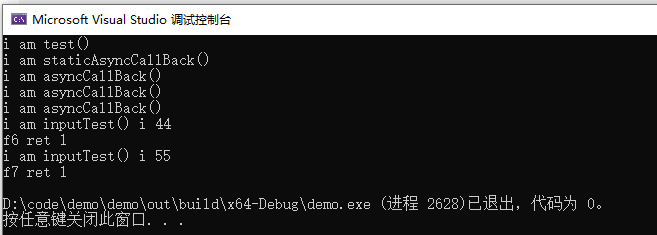浅谈std::function
std::function是C++标准库(C++11以后)提供的一个关于函数调用的模板类,以提供对函数式编程的支持。在C++里面,它常用来绑定回调函数,绑定?是的,它经常结合std::bind来使用。下面介绍下它的常用用法以及一些可能会遇到的坑。
常用用法
- 绑定普通全局函数,静态函数。
- 绑定类的静态函数。
- 绑定类的成员函数,通过类对象。
- 绑定类的成员函数,通过类指针。
- 绑定类的成员函数,通过智能指针对象。
- 绑定类的成员函数,有入参,参数通过占位符绑定到函数对象,调用时输入参数,模板需声明入参。
- 绑定类的成员函数,有入参,参数直接绑定到函数对象,调用时不用输入,直接调用,模板不用声明入参。
具体看下demo源码:
#include <iostream>
#include <sstream>
#include <functional>
#include <chrono>
#include <ctime>
#include <memory>
#include <sys/types.h>
#include <thread>
#include <mutex>
#include <condition_variable>
#include <exception>
#include <string>
#include <unordered_map>
#include <map>
#include <vector>
#include <cstring>
#include <future>
#include <time.h>
#include <random>
#include <regex>
#include <cstring>
#include <string>
typedef std::function<void()> NoInputTask;
typedef std::function<int(int)> InputTask;
class Demo { //有必要,可继承std::enable_shared_from_this模板类
public:
Demo() = default;
~Demo() = default;
void asyncCallBack() {
std::cout << "i am asyncCallBack()" << std::endl;
}
static void staticAsyncCallBack() {
std::cout << "i am staticAsyncCallBack()" << std::endl;
}
int inputTest(int i) {
std::cout << "i am inputTest() i " << i << std::endl;
return 1;
}
private:
int a_;
};
void test() {
std::cout << "i am test()" << std::endl;
}
int main(int argc, char* argv[])
{
//绑定普通函数,无返回值,无入参
NoInputTask f1(test);
if (f1)
f1();
//绑定类静态函数,无返回值,无入参
NoInputTask f2(&Demo::staticAsyncCallBack);
if (f2)
f2();
//绑定类的成员函数,通过类对象,无返回值,无入参
Demo d1;
NoInputTask f3(std::bind(&Demo::asyncCallBack, d1));
if (f3)
f3();
//绑定类的成员函数,通过类指针,无返回值,无入参
Demo* d2 = new Demo();
NoInputTask f4(std::bind(&Demo::asyncCallBack, d2));
if (f4)
f4();
//绑定类的成员函数,通过智能指针对象,无返回值,无入参
std::shared_ptr<Demo> d3(new Demo());
NoInputTask f5(std::bind(&Demo::asyncCallBack, d3));
if (f5)
f5();
//有返回值,有入参,需要绑定占位符,参数在调用时输入
Demo d4;
InputTask f6(std::bind(&Demo::inputTest, d4, std::placeholders::_1));
if (f6) {
int ret = f6(44);
std::cout << "f6 ret " << ret << std::endl;
}
//有返回值,有入参,但是入参不声明,直接绑定到函数对象,调用时直接调用即可
Demo d5;
std::function<int(void)> f7(std::bind(&Demo::inputTest, d5, 55));
if (f7) {
int ret = f7();
std::cout << "f7 ret " << ret << std::endl;
}
return 0;
}
运行结果如下:

可能的坑
前面我们总结了std::function的一些用法,在日常使用中不会有太大的问题。但是,服务端开发的时候,更多的用法是做异步回调,此时对象的生命周期就不由我们控制了。在异步回调中,上面方式中最常用、最可靠的用法是使用智能指针包裹对象,并绑定到函数对象中。而且,如果有必要,对象还需要继承std::enable_shared_from_this模板类,在对象成员函数中绑定新的异步回调的时候,使用shared_from_this可以延长对象的生命周期。
另外,函数调用时,更安全的做法是使用一个临时函数对象拷贝要调用的函数对象,然后调用临时函数对象。当然,这样免不了一些额外的开销。
结尾
关于std::function的介绍就到此结束了,如果上文有错误,欢迎留言或私信指正。如果你有更好的想法或意见,也可以留言或私信。如果觉得还可以,点赞或关注下,码字不易,谢谢。
最后
以上就是怡然鼠标最近收集整理的关于浅谈std::function浅谈std::function常用用法可能的坑结尾的全部内容,更多相关浅谈std::function浅谈std::function常用用法可能内容请搜索靠谱客的其他文章。
本图文内容来源于网友提供,作为学习参考使用,或来自网络收集整理,版权属于原作者所有。








发表评论 取消回复